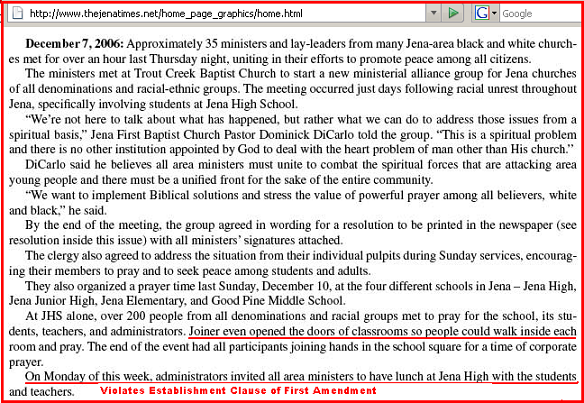
Although Jena School officials denied Black students and parents time at school committee meetings to address the hanging of nooses in the school "noose tree," school officials nonetheless sponsored religious prayer services at the high school, on a Sunday and on a weekday during students' lunch time. This would appear to violate the Establishment Clause of First Amendment of the US Constitution.
An ACLU Legal Bulletin
The Establishment Clause And Public Schools
"Congress shall make no law respecting an establishment
of religion, or prohibiting the free exercise thereof."
These opening words of the First Amendment to the Constitution set forth a dual guarantee of religious liberty. Both the Establishment Clause and the Free Exercise Clause operate to protect the religious liberty and freedom of conscience of all Americans. Quoting Thomas Jefferson, the Supreme Court has stated that the Establishment Clause was intended to accomplish this end by erecting a "wall of separation between Church and State." Everson v. Board of Educ. of Ewing, 330 U.S. 1, 15-16 (1947).
It is one of the fundamental principles of the Supreme Court's Establishment Clause jurisprudence that the Constitution forbids not only state practices that "aid one religion . . . or prefer one religion over another," but also those practices that "aid all religions" and thus endorse or prefer religion over nonreligion. Everson, 330 U.S. at 15. See Wallace v. Jaffree, 472 U.S. 38, 53 (1985)("[T]he individual freedom of conscience protected by the First Amendment embraces the right to select any religious faith or none at all"); see also County of Allegheny v. ACLU Greater Pittsburgh Chapter, 492 U.S. 573, 589-94, 598-602 (1989); Texas Monthly, Inc. v. Bullock, 489 U.S. 1, 17 (1989); Torcaso v. Watkins, 367 U.S. 488, 495 (1961).
For the past 20 years, the federal courts have utilized the three-pronged framework first set forth in Lemon v. Kurtzman, 403 U.S. 602 (1971), to maintain the separation of government and religion. Under the so-called "Lemon test," a court must inquire (1) whether the government's action has a secular or a religious purpose; (2) whether the primary effect of the government's action is to advance or endorse religion; and (3) whether the government's policy or practice fosters an excessive entanglement between government and religion. See 403 U.S. at 612-13. In recent years, the Supreme Court has also frequently asked whether the challenged governmental action constitutes an impermissible "endorsement" of religion. See, e.g., Allegheny, 492 U.S. at 592 (inquiry is whether the government "convey[s] or attempt[s] to convey a message that religion or a particular religious belief is favored or preferred"); id. at 592-94; School District of the City of Grand Rapids v. Ball, 473 U.S. 373, 390 (1985)("[A]n important concern of the effects test is whether the symbolic union of church and state effected by the challenged governmental action is sufficiently likely to be perceived by adherents ... as an endorsement, and by nonadherents as a disapproval, of their individual religious choices").
( . . . )It violates one of the Establishment Clause's most fundamental principles to turn government power over to religion. As the Supreme Court has recognized, the public school is the forum through which basic norms of citizenship are transmitted to the next generation and is thus a "vital civic institution for the preservation of a democratic system of government." See Abington Township, 374 U.S. at 230 (Brennan, J., concurring). When government permits a religious group to take over part of the school's facilities during instructional time, however briefly, it strongly implies official endorsement of that religion. In the Grand Rapids case, the Supreme Court stressed the importance of avoiding any "symbolic link" between government and religion. The Court held that the second ("effects") prong of the Lemon test will not be satisfied where the government fosters a "close identification of its powers and responsibilities with those of any -- or all -- religious denominations." School District of the City of Grand Rapids v. Ball, 473 U.S. at 385. ACLU


No comments:
Post a Comment